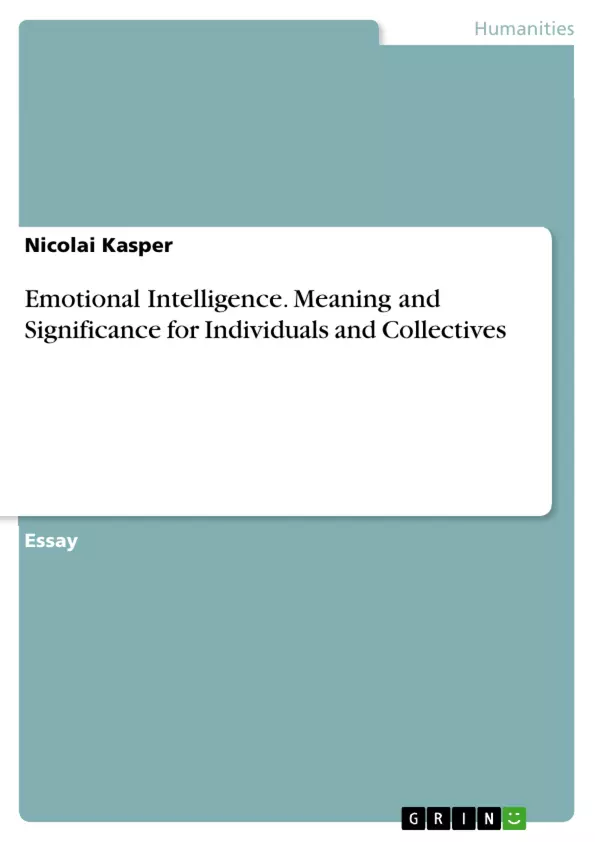This paper aims at clarifying the concept of emotional intelligence and verifying its importance in the context of change for an individual as well as an organization or company. Given the outlook of Oosthoizen and Harari adaptability to change will be one of the key challenges in the 21st Century. The objective of this paper is to provide answers to the questions of what emotional intelligence is about and how it can be utilized in the context of personal life and workplace. Therefore, definitions will be provided for the relevant terminology in chapter three and afterwards, the components and models of emotional intelligence will be laid out in chapter four. In chapter five will focus on the applicability of emotional intelligence in challenging situations for individuals such as change of fundamental life conditions. This section will also present a look at how an individual can improve its emotional intelligence. On that basis, this paper will swift its perspective from the micro level to meso-level and will examine emotional intelligence in the context of organizations and companies and give recommendations for its execution.
Table of Contents
- Introduction
- Definition of emotional intelligence
- Concepts of emotional intelligence
- Emotional intelligence as important skill for individuals dealing with change
- Emotional intelligence from an organizational perspective
- Conclusion
Objectives and Key Themes
This paper aims to clarify the concept of emotional intelligence and explore its significance in navigating change for both individuals and organizations. It examines how emotional intelligence can be utilized in both personal life and the workplace. The paper delves into the impact of the 4th Industrial Revolution (4IR) on the need for adaptability and the importance of emotional intelligence in navigating these changes.
- The impact of the Fourth Industrial Revolution (4IR) on individuals and organizations
- The definition and components of emotional intelligence
- The role of emotional intelligence in managing change and adapting to new situations
- The application of emotional intelligence in personal life and the workplace
- Strategies for developing and enhancing emotional intelligence
Chapter Summaries
- Introduction: This chapter introduces the Fourth Industrial Revolution (4IR) and its transformative impact on various aspects of life, emphasizing the need for adaptability and emotional intelligence in navigating these changes. The paper aims to explore emotional intelligence and its relevance in the context of a rapidly evolving world.
- Definition of emotional intelligence: This chapter provides a definition of emotional intelligence and explores its importance in dealing with change. It acknowledges the perception of change as either an opportunity or a threat, and how this perception triggers different emotional responses.
- Concepts of emotional intelligence: This chapter delves into the various models and components of emotional intelligence, providing a comprehensive understanding of its various facets.
- Emotional intelligence as important skill for individuals dealing with change: This chapter focuses on the applicability of emotional intelligence in challenging situations for individuals, such as adapting to fundamental life changes. It explores how emotional intelligence can be developed and improved.
- Emotional intelligence from an organizational perspective: This chapter shifts the focus from the individual to the organizational level, examining the role of emotional intelligence in companies and providing recommendations for its implementation.
Keywords
This paper focuses on emotional intelligence, 4th Industrial Revolution (4IR), change management, adaptability, personal development, organizational culture, and the impact of technological advancements on the human experience.
Frequently Asked Questions
What is Emotional Intelligence (EI)?
Emotional Intelligence refers to the ability to identify, understand, and manage one's own emotions as well as the emotions of others.
Why is EI important in the 21st century?
With the 4th Industrial Revolution (4IR), adaptability to rapid change is a key challenge; EI helps individuals and organizations navigate these transitions effectively.
Can Emotional Intelligence be improved?
Yes, the paper presents methods and strategies for individuals to develop and enhance their emotional intelligence through practice and self-reflection.
How does EI benefit organizations?
Organizations with high EI foster better communication, stronger leadership, and a more resilient culture capable of handling organizational change.
What are the main components of Emotional Intelligence models?
Typical components include self-awareness, self-regulation, motivation, empathy, and social skills.
How does EI relate to the perception of change?
EI influences whether an individual perceives change as a threat or an opportunity, triggering different emotional and behavioral responses.
- Quote paper
- Nicolai Kasper (Author), 2020, Emotional Intelligence. Meaning and Significance for Individuals and Collectives, Munich, GRIN Verlag, https://www.grin.com/document/1159039



